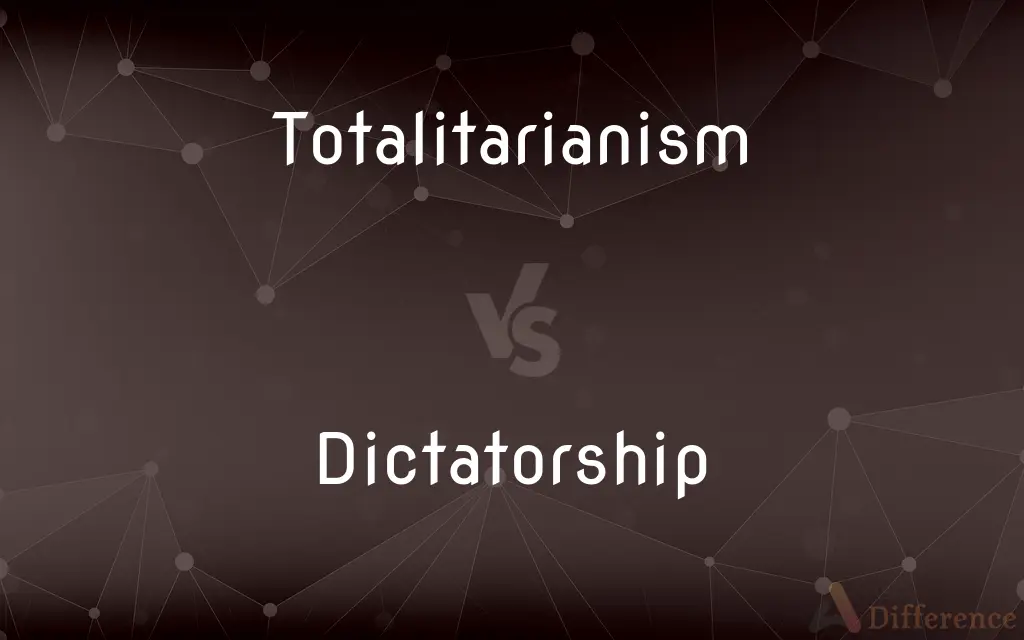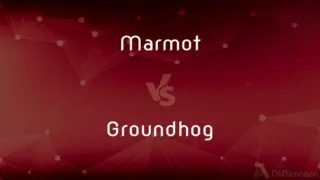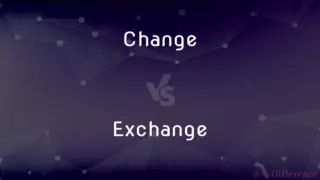Totalitarianism vs. Dictatorship — What's the Difference?
By Urooj Arif & Fiza Rafique — Updated on March 11, 2024
Totalitarianism is a political system where state holds absolute control over all aspects of life, through pervasive surveillance and propaganda. Dictatorship is a form of government where a single leader or group has nearly total power.

Difference Between Totalitarianism and Dictatorship
Table of Contents
ADVERTISEMENT
Key Differences
Totalitarianism extends beyond the simple concentration of power in the hands of a single ruler or party; it is characterized by the attempt to regulate every aspect of public and private life. This includes the economy, education, art, and personal beliefs and values. Dictatorship, on the other hand, primarily refers to the concentration of political power. In a dictatorship, a single leader, dictator, or a small group wields significant power, often obtained and maintained through force or the threat thereof.
Totalitarian regimes often employ propaganda, censorship, and mass surveillance to maintain control and suppress dissent, aiming to create a uniform society under one ideology and authority. While dictatorships can exhibit control over many aspects of life, they do not necessarily seek to control every aspect of personal and social life to the extent seen in totalitarian systems.
The key difference lies in the scope and intent of control. Totalitarianism aims for total control over society and the individual, often driven by a specific ideology, whereas dictatorships may be more focused on the centralization of political power without the same level of comprehensive control over all aspects of life.
In terms of governance, totalitarian regimes often rely on a single party or leader and a complex bureaucracy to penetrate all facets of life, using technology, propaganda, and state-controlled media to enforce conformity and suppress opposition. Dictatorships might also use these tools, but their use is not as extensive or focused on controlling thought and ideology as in totalitarian regimes.
The transition from a dictatorship to a totalitarian state can occur if the regime begins to systematically control more aspects of life, pushing an overarching ideology and eliminating personal freedoms not just in the public sphere, but also intruding into the private lives of its citizens.
ADVERTISEMENT
Comparison Chart
Definition
A political system where the state seeks to control all aspects of public and private life.
A form of government where a single leader or group holds significant power.
Scope of Control
Comprehensive, including the economy, education, beliefs, and even private life.
Primarily political, with varying degrees of control over other aspects of life.
Ideology
Often driven by a specific ideology that seeks to reshape society and individual beliefs.
Not necessarily ideologically driven; focuses more on power consolidation.
Tools
Uses propaganda, mass surveillance, and censorship extensively to maintain control and suppress dissent.
May use force, coercion, and limited propaganda to maintain power.
Examples
Nazi Germany under Hitler, Soviet Union under Stalin.
Military dictatorships or autocratic regimes without comprehensive ideological control.
Compare with Definitions
Totalitarianism
Seeks to regulate every aspect of public and private life.
In a totalitarian regime, the government controls media, education, and even family life.
Dictatorship
Concentrates political power in the hands of a single leader or a small group.
In a dictatorship, the dictator has the ultimate say in all governmental decisions.
Totalitarianism
Characterized by pervasive surveillance and propaganda.
Totalitarian governments often use mass surveillance to monitor and control their citizens.
Dictatorship
May not seek to control every aspect of life as in totalitarianism.
Some dictatorships focus on political power without delving deeply into controlling personal beliefs or cultural life.
Totalitarianism
Ideologically driven, aiming for a uniform society.
Totalitarian states push a specific ideology and suppress any form of dissent or deviation.
Dictatorship
Power is often maintained through force or coercion.
Dictators commonly use military force to maintain control and suppress opposition.
Totalitarianism
Examples include Nazi Germany and the Soviet Union.
The totalitarian nature of Nazi Germany was evident in its control over all societal aspects, from politics to culture.
Dictatorship
Can exist without a comprehensive ideological drive.
Unlike totalitarian regimes, dictatorships may not always push for ideological conformity across all aspects of society.
Totalitarianism
Totalitarianism is a concept for a form of government or political system that prohibits opposition parties, restricts individual opposition to the state and its claims, and exercises an extremely high degree of control over public and private life. It is regarded as the most extreme and complete form of authoritarianism.
Dictatorship
A dictatorship is a form of government characterized by a single leader or group of leaders and little or no toleration for political pluralism or independent media. According to other definitions, democracies are a form of government in which "those who govern are selected through periodically contested elections (in years)"; therefore, dictatorships are "not democracies,.".With the advent of the 19th and 20th centuries, dictatorships and constitutional democracies emerged as the world's two major forms of government, gradually eliminating monarchies with significant political power, the most widespread form of government in the pre-industrial era.
Totalitarianism
Of, relating to, being, or imposing a form of government in which the political authority exercises absolute and centralized control over all aspects of life, the individual is subordinated to the state, and opposing political and cultural expression is suppressed
"A totalitarian regime crushes all autonomous institutions in its drive to seize the human soul" (Arthur M. Schlesinger, Jr.).
Dictatorship
The office or tenure of a dictator.
Totalitarianism
A practitioner or supporter of such a government.
Dictatorship
A state or government under dictatorial rule.
Totalitarianism
A system of government in which the people have virtually no authority and the state wields absolute control, for example, a dictatorship.
Dictatorship
Absolute or despotic control or power.
Totalitarianism
A form of government in which the ruler is an absolute dictator (not restricted by a constitution or laws or opposition etc.)
Dictatorship
A type of government where absolute sovereignty is allotted to an individual or a small clique.
Totalitarianism
The principle of complete and unrestricted power in government
Dictatorship
A government which exercises autocratic rule.
Dictatorship
Any household, institution, or other organization that is run under such sovereignty or autocracy.
Dictatorship
The office, or the term of office, of a dictator; hence, absolute power.
Common Curiosities
What is the role of ideology in totalitarianism and dictatorship?
In totalitarianism, ideology plays a central role in shaping society and individual beliefs, whereas in dictatorships, the focus is more on maintaining power, and ideology may not be as central or comprehensive.
Are all totalitarian states dictatorships?
While all totalitarian states are dictatorial in nature due to their concentration of power, not all dictatorships achieve the level of comprehensive control over society and ideology characteristic of totalitarianism.
How do totalitarian regimes maintain control?
Totalitarian regimes maintain control through extensive propaganda, censorship, mass surveillance, and the suppression of dissent, often enforcing a uniform ideology.
Is it possible for a totalitarian regime to have multiple ruling parties?
Totalitarian regimes typically centralize power under one party or leader to ensure complete control and uniformity of ideology, making multiple ruling parties incompatible with true totalitarianism.
Can a democratic country become totalitarian?
While democratic principles oppose totalitarianism, history shows that democratic countries can slide into totalitarianism through gradual erosion of freedoms, centralization of power, and imposition of ideology, often under the guise of national security or emergency measures.
How does totalitarianism differ from a traditional dictatorship?
Totalitarianism involves the state's attempt to control all aspects of life, driven by a specific ideology, whereas a traditional dictatorship concentrates political power without necessarily seeking to control every aspect of private and public life.
How do citizens resist in totalitarian regimes?
Resistance in totalitarian regimes can take forms like underground movements, dissemination of banned information, public protests, or international advocacy, though such actions carry high risks due to pervasive surveillance and state repression.
What role do technology and surveillance play in modern dictatorships and totalitarian regimes?
Modern technology has enhanced the ability of dictatorships and totalitarian regimes to surveil and control their populations through digital monitoring, data collection, and controlling online information, raising concerns about privacy and freedom.
How do totalitarian regimes control the media and information?
Totalitarian regimes often control media and information through state ownership, censorship, propaganda campaigns, and punishment for dissenting voices, creating a manipulated narrative that supports the regime's ideology.
How do international communities respond to totalitarian regimes and dictatorships?
International responses can include diplomatic pressure, sanctions, human rights advocacy, and in extreme cases, intervention. However, geopolitical interests and the principle of sovereignty often complicate these responses.
Can a dictatorship evolve into a totalitarian regime?
Yes, a dictatorship can evolve into a totalitarian regime if it starts to impose control over all aspects of society, pushing a specific ideology and eroding personal freedoms.
What psychological effects do totalitarian regimes have on their citizens?
Totalitarian regimes can instill a culture of fear, conformity, and mistrust among citizens, affecting mental health and social cohesion. The pervasive control over life can lead to a sense of powerlessness and isolation.
Are dictatorships always authoritarian?
Most dictatorships are authoritarian, as they involve a lack of political pluralism and centralized control. However, the degree of authoritarianism can vary, and not all authoritarian regimes are outright dictatorships if there's some level of political competition or power sharing.
Can economic policies distinguish dictatorships from totalitarian regimes?
While economic policies vary widely among dictatorships, totalitarian regimes often implement centralized control over the economy to further their control and ideological goals, whereas dictatorships might allow for more economic freedom if it doesn't threaten their power.
How do totalitarian regimes and dictatorships impact international relations?
Totalitarian regimes and dictatorships can destabilize international relations through aggressive policies, human rights abuses, and the suppression of dissent, often leading to international condemnation, sanctions, or isolation.
Share Your Discovery

Previous Comparison
Marmot vs. Groundhog
Next Comparison
Change vs. ExchangeAuthor Spotlight
Written by
Urooj ArifUrooj is a skilled content writer at Ask Difference, known for her exceptional ability to simplify complex topics into engaging and informative content. With a passion for research and a flair for clear, concise writing, she consistently delivers articles that resonate with our diverse audience.
Co-written by
Fiza RafiqueFiza Rafique is a skilled content writer at AskDifference.com, where she meticulously refines and enhances written pieces. Drawing from her vast editorial expertise, Fiza ensures clarity, accuracy, and precision in every article. Passionate about language, she continually seeks to elevate the quality of content for readers worldwide.
















































